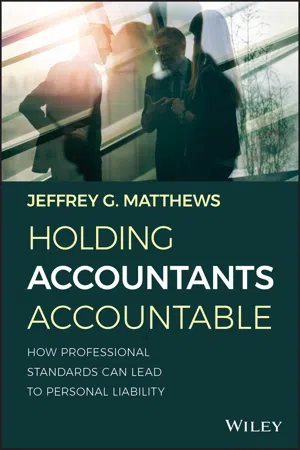
Holding Accountants Accountable
How Professional Standards Can Lead to Personal Liability
- English
- ePUB (mobile friendly)
- Available on iOS & Android
Holding Accountants Accountable
How Professional Standards Can Lead to Personal Liability
About this book
An essential guide for practitioners on avoiding unethical situations in a fraud investigation—provides tips, techniques, and real-life examples
Credentialed accountants, auditors, and fraud examiners who fail to identify fraud and misconduct may be in violation of their professional standards. Among these standards are requirements to exercise professional and moral judgment, act in the best interest of the public, maintain integrity, objectivity, and independence, render opinions based on evidence and documentation, and exercise due care in planning and discharging professional activities. Failing to adhere to professional standards and ethical codes have serious consequences for CPAs, CFEs, and CIAs engaged in fraud investigations. Fraud helps readers avoid unethical situations in fraud investigations and stay within the boundaries of professional guidelines and standards.
Author Jeffrey Matthews combines real-world techniques and practical advice with personal insights from his experience as a forensic accountant. Detailing how he faced death threats, retaliation, and family hardships during actual fraud investigations, the author shares how despite serious challenges, he never deviated from professional standards. The author demonstrates how accountants can avoid being caught in unethical practices and examines the common tendencies that hinder the ability to detect, deter, and prevent fraud and misconduct. This fascinating, highly-relevant book will help practitioners:
- Recognize current and emerging trends to identify new areas of weakness
- Address time and budget constraints with effective delegation and supervision of lower-level staff
- Maintain a healthy dose of skepticism by 'testing not accepting'
- Understand the effort and expertise required to perform an investigation before accepting engagements
- Avoid establishing biases and pre-determining outcomes before accepting assignments
A full-featured resource, complete with PowerPoint slides and a test bank, Fraud is invaluable for auditors, accountants, and other certified fraud examiners.
Tools to learn more effectively

Saving Books

Keyword Search

Annotating Text

Listen to it instead
Information
CHAPTER 1
F – Forgetting the Present and the Past
Accounting Humor

FRAUD IN THE PRESENT AND PAST





- Trust. Whether the business is family-owned or a new start-up, it is entirely possible that management knows each and every employee. With that familiarity comes trust. And as we will learn, trust alone is a terrible control.
- Lack of resources. Resources can consist of people and money. Small companies may find it challenging to adequately segregate critical duties, or invest in external audits (that are often not required).
- Lack of controls. In addition to lacking resources, small organizations may lack the knowledge to implement adequate internal controls. It is very difficult to monitor controls that aren't there.
Table of contents
- Cover
- Table of Contents
- Preface
- Introduction
- CHAPTER 1: F – Forgetting the Present and the Past
- CHAPTER 2: R – Relying on Others
- CHAPTER 3: A – Accepting, Not Verifying
- CHAPTER 4: U – Underestimating the Effort
- CHAPTER 5: D – Determining the Outcome Before the Work
- CHAPTER 6: Overcoming Barriers to Reporting Fraud and Misconduct
- About the Author
- Acknowledgments
- Index
- End User License Agreement
Frequently asked questions
- Essential is ideal for learners and professionals who enjoy exploring a wide range of subjects. Access the Essential Library with 800,000+ trusted titles and best-sellers across business, personal growth, and the humanities. Includes unlimited reading time and Standard Read Aloud voice.
- Complete: Perfect for advanced learners and researchers needing full, unrestricted access. Unlock 1.4M+ books across hundreds of subjects, including academic and specialized titles. The Complete Plan also includes advanced features like Premium Read Aloud and Research Assistant.
Please note we cannot support devices running on iOS 13 and Android 7 or earlier. Learn more about using the app